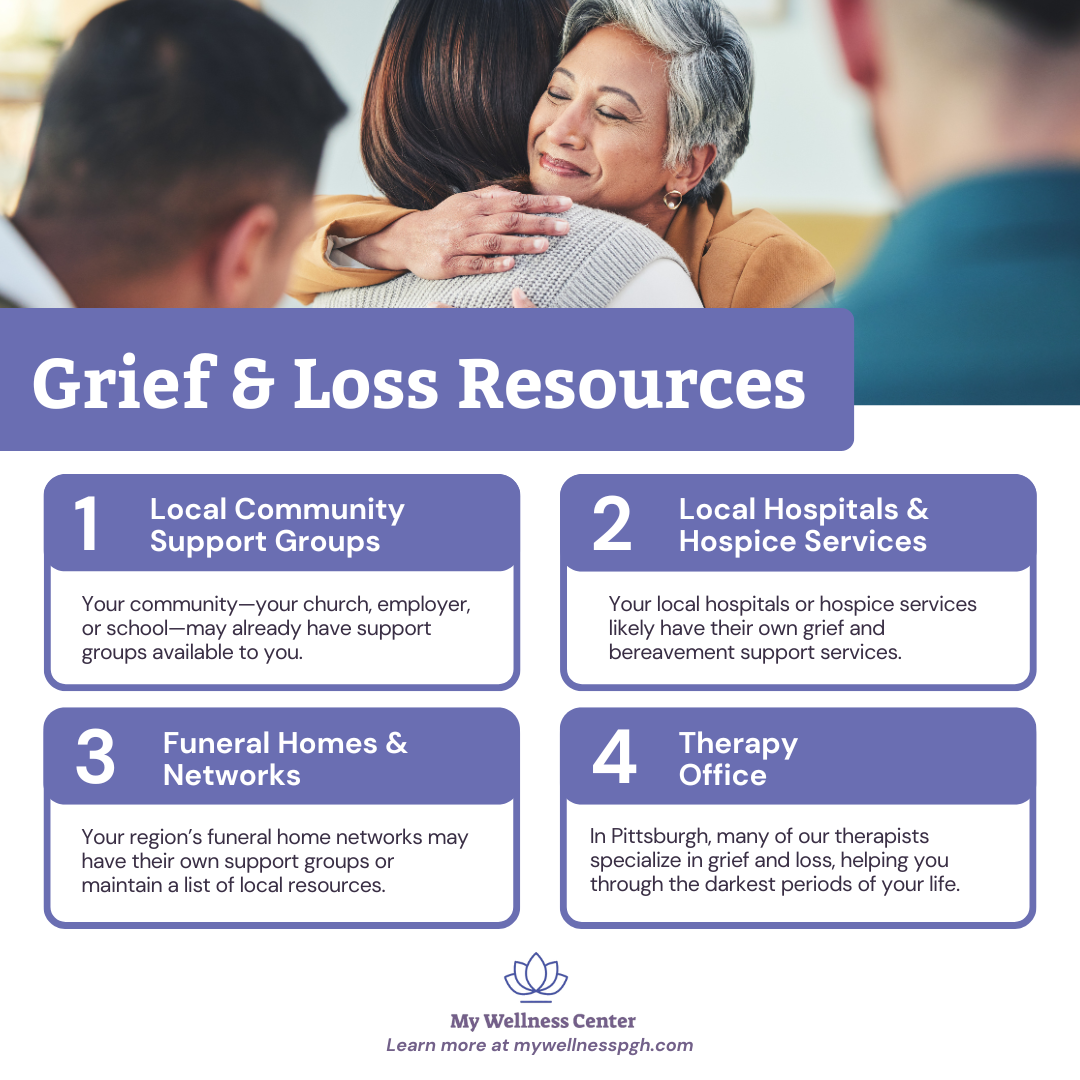Grief hurts. When you lose someone you love, it feels like your life ends as well. The emotional pain can quickly spill through your entire body, leaving you feeling tired, hurt, and confused.
That’s why therapy for grief and loss is so important: It can help you gain the perspective necessary to continue moving forward while honoring your loved one.
Use the table of contents to learn more:
Table of Contents
What Will You Discuss In Therapy for Grief and Loss?
What Are the 5 Stages of Grief?
What Are the Different Types of Grief?
Grief and Loss Resources
Find A Pittsburgh Therapist For Grief And Loss
What Will You Discuss In Therapy for Grief and Loss?
If you decide to enter grief therapy, here’s what you should know: It’s not about “fixing” you—it’s about giving you a safe, supportive space to process one of life’s hardest experiences.
Every person’s grief looks different, so your sessions will be tailored to your unique needs. Some of the themes you may explore include:
1. Telling Your Story – You’ll have the chance to openly share memories, emotions, and the story of your loss without fear of judgment. Simply being heard can be an important first step toward healing.
2. Understanding the Grieving Process – A therapist can help you make sense of what you’re feeling by explaining common patterns of grief—such as the five stages—while also normalizing that your journey may look different.
3. Managing Intense Emotions – Grief often brings waves of sadness, anger, guilt, or even relief. Therapy helps you develop healthy coping skills for managing these emotions when they feel overwhelming.
4. Exploring Identity and Life Changes – Losing a loved one can change how you see yourself and your role in the world. Therapy can help you navigate questions of identity, purpose, and what your life looks like moving forward.
5. Developing Coping Strategies – From mindfulness exercises to journaling prompts, your therapist may guide you toward tools that make the pain more manageable day to day.
6. Honoring Your Loved One – Therapy isn’t about forgetting—it’s about finding ways to carry the memory of your loved one in a way that feels meaningful and healing.
7. Planning for the Future – Over time, your sessions may shift toward rebuilding routines, re-engaging in relationships, and imagining a future where joy and sadness can coexist.
What Are the 5 Stages of Grief?
You’re likely familiar with the five stages of grief, which were first outlined in psychiatrist Elisabeth Kübler-Ross’s 1969 book, On Death And Dying.
The five stages of grief are:
- Denial – Often the initial shock response, where the loss feels unreal and you may struggle to accept that it actually happened.
- Anger – A stage marked by frustration, resentment, or even rage directed at yourself, others, or the situation itself.
- Bargaining – The search for control, often involving “what if” thoughts or making deals with a higher power to undo the loss.
- Depression – A deep sense of sadness, emptiness, and withdrawal that sets in once the permanence of the loss becomes clear.
- Acceptance – The gradual process of acknowledging the reality of the loss and learning how to move forward while carrying the memory of your loved one.
Virtually everyone who experiences grief experiences all five stages. Remember, though, that your stages might not be linear or in equal timelines. It’s totally possible, for example, that you feel depression before you feel anger, and it’s also possible that you encounter the Bargaining stage for a day and Depression for a month.
What Are the Different Types of Grief?
In our article on Why Can’t I Seem to “Get Over” My Grief, we outline some of the most common types of grief you may encounter.
Those include:
- Anticipatory Grief – Anticipatory grief is when you suffer through the expectation of someone passing away, such as after the diagnosis of a terminal illness.
- Chronic Grief – Grief that continues for years without resolution, often resurfacing with the same intensity long after the loss.
- Complicated Grief (or Prolonged Grief Disorder) – When grief symptoms don’t ease over time and instead remain intense or even worsen, making it hard to function in daily life.
- Delayed Grief – When emotions are suppressed at the time of loss, only to surface months or even years later.
- Disenfranchised Grief – Disenfranchised grief is when you experience grief that’s difficult to talk about because of the stigma attached. For example, if a family member dies of suicide or your childhood abuser passes away from cancer, you may feel intense emotions but struggle to explain them to your circle of family and friends.
- Exaggerated Grief – Intense grief that amplifies into other mental health issues such as depression, anxiety, substance misuse, or risky behaviors.
- Inhibited or Suppressed Grief – When a person avoids or denies their feelings, often because they feel they “should” be coping better or don’t have a safe space to express emotion.
- Traumatic Grief – Grief complicated by the suddenness, violence, or unexpected nature of a death, often intertwined with PTSD-like symptoms.
Grief and Loss Resources
You’ll find a wide variety of grief and loss resources online and in your local community.

If you need support, check out these tried-and-true resources:
1. Local Community Support Groups
Your community may already have support groups available to you. Your church, employer human resources, or even school system may have connections to support groups to connect you with individuals and professionals dealing with grief and loss.
2. Local Hospitals & Hospice Services
Your local hospitals or hospice services likely have their own grief and bereavement support services—and they’re sometimes complementary.
In Pittsburgh, both UPMC and AHN have their own bereavement resources to lend a hand to those who have lost loved ones, especially if they passed away in the hospital or in hospice care.
3. Funeral Homes & Networks
Your region’s funeral home networks may have their own support groups or maintain a list of local resources.
The Allegheny County Funeral Directors Association, for example, maintains a database of resources available to the public.
4. Therapy Offices
Of course, therapy is a wonderful resource for managing grief. In Pittsburgh, many of our therapists specialize in grief and loss, helping you through the darkest periods of your life.
Find A Pittsburgh Therapist For Grief And Loss
If you’re looking for a Pittsburgh therapist for grief and loss, contact us. We’ll pair you with an experienced, licensed therapist ready to help you process your loss and the powerful emotions that come with it.

